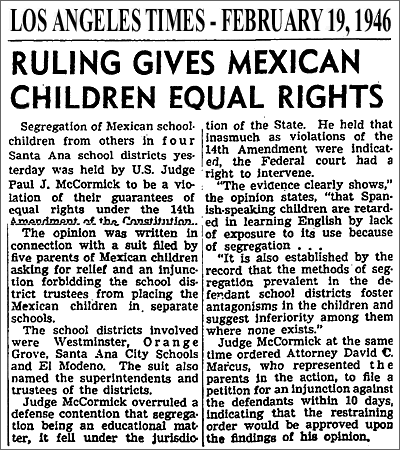SYLVIA MENDEZ GETS HIGHEST U.S. AWARD & HONOR

LANDMARK MENDEZ V. WESTMINSTER CASE RECEIVES SOME LONG OVERDUE RECOGNITION
continued from Page Two
a direct assualt on the liberties of the Mexican American community, it's quite conceivable what would be discovered is that there is no other ethnic group in the history of the United States which has had more laws passed against it in an attempt to prevent its pursuit and participation in the American dream. Unfortunately, as of this writing, this persistent malicious intent of many within the American public continues, the most telling case in point being the state of Arizona and its legislature today.
Nevertheless, while this important and much needed dialogue on the oppression of ethnic groups in the United States goes beyond the common white and black paradigm only, it is important to realize that for the real story of our country to truly reflect the truth of its past, an inclusion of all the players in our great American experiment is certainly required. This does necessitate a discussion of several other ethnic groups more than just an addition of the Latino American saga alone. A stark example of this would be an accounting of the Chinese Exclusion Act of 1882, which represents the first law ever enacted by Congress to deny entry into the United States based on ethnicity. It was the result of fears in the white American community about the industrious and hard-working ethic of the Chinese immigrant, which at the time was labeled as a threat to white American culture, health, and jobs. Sound familiar? Replace the health issue with that of safety and you will have a direct parallel on some of the rhetoric being heard about the Mexican immigrant today. Also, even before the segregation of Mexican American children in California schools, the children of Chinese immigrants were not allowed into any public schools at all until 1885. The exception to this was the San Francisco Bay Area, which had always been more accepting and tolerant of ethnic and other minorities. As such, while it did exist on the books, the segregation of Mexican American children was far less severe in Northern California, as oppossed to the harsh reality of its full implications being felt in the more highly oppressive environments of Southern California.
With President Obama's awarding of the Presidential Medal of Freedom to Sylvia Mendez last week, he has significantly contributed to the effort of elevating the discussion of ethnic relations in the U.S. to be more inclusive. For this, he should be acknowledged and respected. Below is a brief accounting of the Mendez v. Westminister case. Hopefully, from here on, it will now be included in our history books. It is for this fight, which is why Sylvia received her medal.
Mendez v. Westminster: First Successful Anti-Segregation Case in a U.S. Federal Court
On March 2, 1945, in the court case Mendez et al. v. Westminster School District et al., five Mexican American fathers from Orange County, CA, assisted with the legal prowess of an established Jewish American civil rights attorney, David Marcus, filed a lawsuit at the U.S. District Court of Los Angeles that challenged the routine practice of California school districts which segregated Mexican American children into inferior and non-equipped public schools. The fathers who fought on behalf of their families and the community were: Thomas Estrada, William Guzman, Gonzalo Mendez, Frank Palomino, and Lorenzo Ramirez. In addition to the Westminster School District, Garden Grove, Santa Ana, and El Modena school districts were also involved. The legal representation was primarily paid for initially by Gonzalo Mendez, a successful farmer.
On February 18, 1946, federal district court judge Paul McCormick ruled in favor of the plaintiffs reasoning that segregated education was severly damaging both psychologically and socially for the Mexican American children. The school districts appealed this decision arguing that federal courts had no authority over education. But, on April 14, 1947, the U.S. Court of Appeals for the Ninth Circuit upheld McCormick's decision ushering in the end to roughly 100 years of segregation in California. Mendez v. Westminster became the key precedent case and model for Brown v. Board of Education which would latter end segregation throughout the entire U.S.


